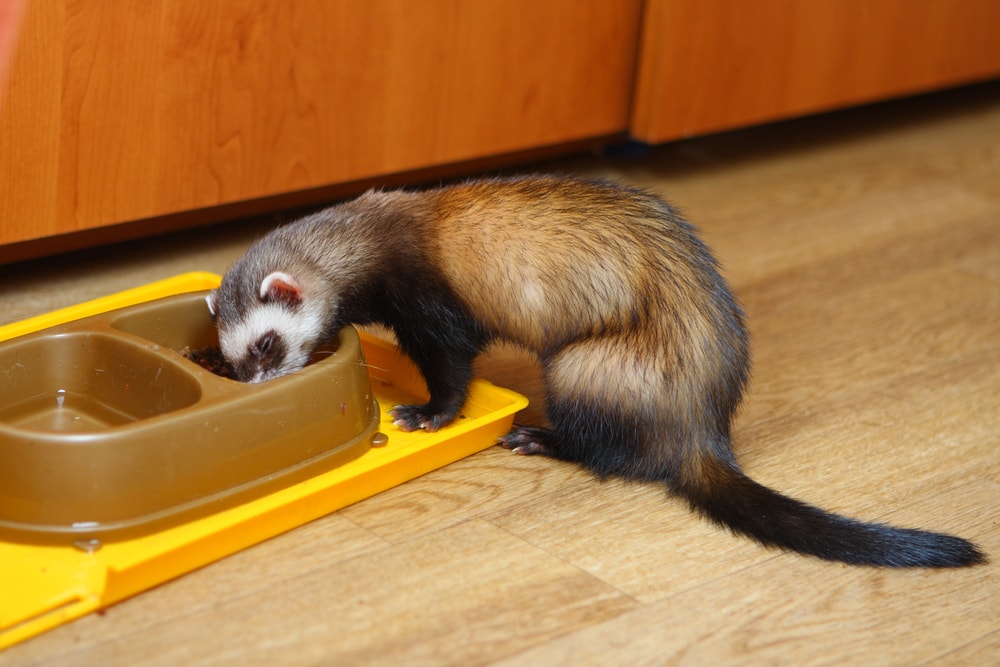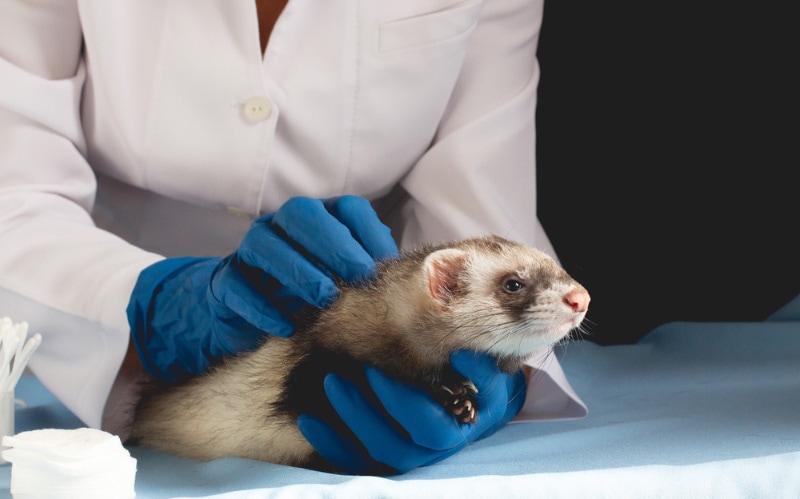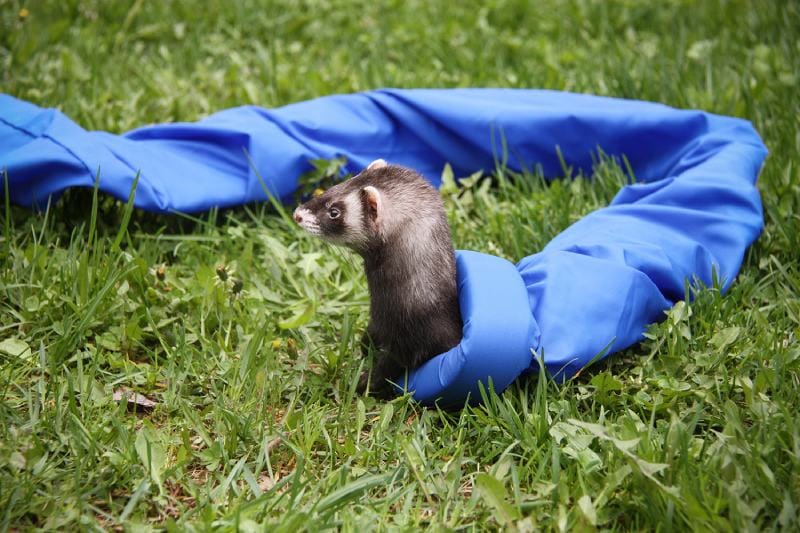Why Is My Ferret Shaking? 5 Vet-Approved Reasons
Updated on

Ferrets are adorable creatures, and they make great pets. However, owning a ferret certainly isn’t the same as owning any other type of pet. If you’re considering adopting one as a pet, there are a few things that you need to know.
Ferrets can exhibit some pretty strange behaviors, which can be quite concerning if you don’t know what you’re looking at. One of the most common behaviors ferret owners report worrying about is that their ferret is shaking. You might wonder if they’re having a seizure or are too cold.
There are a number of concerns that run through a pet owner’s head when they notice their ferret shaking, and all of them are worrisome. In most cases, the shaking is perfectly normal, and there’s no cause for concern. If you’re worried about your ferret’s shaking, we’ll try to lay those fears to rest in the guide below, so join us.
The 5 Reasons Your Ferret Might Be Shaking:
1. During/After Eating
Most ferret owners can tell you it’s common to see ferrets shaking during and after eating. This is because the ferret’s metabolism speeds up faster when they are eating. You’ll see your ferret shaking during eating and for a little bit afterward as well. However, it should only take a few minutes for the shaking to stop. If your ferret continues to shake for hours, there could be something else going on, and it’s best to visit your veterinarian.

2. During/After Sleep
The ferret’s metabolism speeds up when they are sleeping. In fact, ferrets actually burn most of their energy when sleeping, as opposed to doing it when they are awake. This increase in the ferret’s metabolism can cause them to shake while sleeping. This should cease shortly after the ferret wakes up, but expect it to last at least a few minutes.
3. Excitement/Playing
If you’ve ever owned a ferret, you already know that they are often very energetic little creatures, especially when running around playing. Ferrets carry quite a bit of excitement in their tiny bodies all the time. When the excitement builds up, the ferret can’t keep it all in, and it spills over in the form of shaking.

4. Stressed/Nervous
Ferrets are not only excitable creatures; they can be quite nervous and skittish at times. This is completely different from the excited shaking we described above. If your ferret is shaking from being stressed or anxious, it can eventually affect their health if it becomes a regular or chronic issue.
5. Illness/Pain
While in most cases, it’s nothing serious when your ferret is shaking, there are instances where they might be ill or in pain. If your ferret’s shaking is combined with vomiting, lethargy, inappetence, or any other troubling sign, it’s time to get the ferret to the vet right away.
While ferrets are usually quite robust little creatures, there are some diseases, such as insulinoma, that could cause shaking.

How to Calm Your Ferret
You can try three things to calm your ferret if you think they’re shaking because of stress or anxiety. If none of these methods work for you, you should consult your vet for help with your ferret’s anxiety.
Identify the Cause of the Stress
One of the first things you should do if you feel your ferret is stressed is to identify the cause. Sometimes being in a new environment or a noise that the ferret isn’t used to can cause stress and shaking. You can try moving your pet to a quiet room to see if they calm down and stop shaking.
Once the ferret has stopped shaking and is no longer under stress, you can train them to get used to the thing that scared them, if it is something they will be exposed to often. You can expose them to the noise or new area for short periods every day.
When the ferret does well and does not shake, give them a treat. Positive reinforcement is a great way to train your ferret, just as it is with dogs and cats. Soon, hopefully, they will start to associate the treat with the new environment or noise, and you won’t have any more problems with your pet becoming stressed.
Be careful of doing the opposite, however, and rewarding their fear. It is common, and natural, to want to spoil your pet when they are stressed or scared, but this only serves to reinforce that reaction. Cuddling is okay, but save the treats for when they settle down, so they learn to associate a reward with feeling calm.
Be Loving and Patient

Ferrets love attention, and it’s going to take time to find out what is stressing your furry friend. Ferrets are incredibly loving, so when they’re stressed, it helps to be loving in return. For example, try putting them on your lap and petting them to get them to calm down, or hold them and rock them from side to side, which is something else ferrets love.
It’s never a bad idea to pick up your ferret when they’re shaking from stress. Ferrets love to be hugged and cuddled, and it just might help. You’ll also need to be patient with your pet until you can determine the problem and fix it.
Turn Up the Volume
You’re not the only one who enjoys listening to music in your house. Your ferret loves music too. Play a slow, soothing song when your ferret is anxious. However, if your ferret seems depressed, it might be better to put on an upbeat rock song for them to get excited about and try to dance along to.
If the previous tips don’t calm your ferret, it’s time to talk to your vet about other options. Being stressed and anxious all the time can lead to health problems, and no one wants that to happen to their ferret.
What Other Strange Behaviors Do Ferrets Exhibit?

As you probably know, shaking isn’t the only strange behavior that ferrets exhibit. We’ll explain a few of the most common weird behaviors now.
Playing Dead
Ferrets often play dead and can undoubtedly scare you if you don’t know what they are doing. It’s not that ferrets play dead as opossums do, but they sleep very deeply. If you shake or pinch them when they sleep, they will likely not wake up.
Piling Up to Sleep
If you have more than two ferrets, you might have noticed them piling up to sleep. Even if you’ve provided beds for each ferret, they’ll still all climb into one bed to go to sleep. It may look uncomfortable, but to the ferrets, it isn’t. Don’t worry about one of them suffocating, since it is just how they prefer to sleep, all together in a pile.
Running into Things
Ferrets also run into things, and they do it quite often. It isn’t because of their bad eyesight. Instead, it’s because they are so full of pent-up energy when you open the door of their cage that they burst out of it and run off in excitement. This is considered a sign of good health. Ferrets also have a high tolerance for pain, so they don’t feel it when they run into the door anyway.
These are just a few of the most common strange behaviors you’ll see once your ferret gets comfortable in your home. There are more strange behaviors, but we’ll let you discover those for yourself.
Conclusion
Ferrets are adorable creatures that exhibit quite a few strange behaviors. One of the more troubling behaviors is shaking uncontrollably. Most ferret owners worry when their ferret starts shaking, but nine times out of ten, there’s nothing to be concerned about. Ferrets are excitable creatures and have quite a bit of energy built up in their tiny bodies; sometimes, it comes out in the form of shaking. However, if your ferret shows other signs along with shaking, contact your vet for a full examination.
See Also:
- Are Ferrets Hypoallergenic? Vet-Reviewed Facts & Tips
- Why Does My Ferret Bite My Feet? 6 Common Reasons & What to Do
Featured Image Credit: Couperfield, Shutterstock













